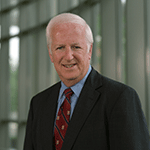
Echoing recent concerns regarding the “fiscal cliff,” Washington University in St. Louis administrators are urging Congress and the White House to reach a compromise to avoid wide-ranging, across-the-board federal spending cuts that would take effect March 1.
University leaders including Chancellor Mark S. Wrighton and Larry J. Shapiro, MD, executive vice chancellor for medical affairs and dean of the School of Medicine, say they are deeply troubled by the potential impact of a “sequester” and the harm it would bring to education, health care, scientific research and innovation and the economy.
“Our leaders in Washington must make a critical decision that will have far-reaching consequences for America’s colleges and universities and the federal dollars they depend upon,” says Wrighton, who sent a letter expressing his concerns to Missouri’s congressional delegation earlier this week.
“These dollars represent lost opportunity for the nation. Students will find it more difficult to attend educational institutions of their choice. Scholars will find it harder to receive support for ground-breaking research. But ultimately, it will be our long-term national economy and security that will suffer without a well-trained workforce ready to invent and utilize ideas and technologies for the future.”

Says Shapiro: “Such significant reductions in spending would have sobering consequences for our health, our economy, our future. These cuts would delay life-saving treatments, cost jobs and deliver a blow to this country’s global competitiveness.”
Wrighton and Shapiro encourage Washington University’s faculty, students, staff, alumni and others to examine what is at risk and share their concerns with legislators.
To that end, the two are encouraging people to consider signing an online petition launched by the American Association for the Advancement of Science (AAAS) that urges the White House and Congress to achieve a bipartisan budget compromise that avoids sequestration and “moves the country on to sound fiscal footing without sacrificing our nation’s crucial investments in science and technology.”
The petition goes on to say: “Almost every national priority — from health and defense, agriculture and conservation, to hazards and natural disasters — relies on science and engineering. As another fiscal cliff approaches, placing a significant burden on federal research and development investments, as sequestration would do, is nothing less than a threat to national competitiveness. Support for science is support for economic growth, innovation, and technological progress.”
If sequestration occurs, the AAAS projects that federal research and development funding will be reduced by about $54 billion by 2017. Such cuts would do significant damage to scientific research and would eliminate jobs and stall innovation, the organization warns.
The AAAS, through its “Speak up for Science” petition, is urging researchers, professionals, students and others, especially those in science, technology, engineering and math fields, to sign the petition by Tuesday evening, Feb. 26. The AAAS will submit the petition Wednesday, Feb. 27, to legislators and the White House.
To access the petition, follow this link.